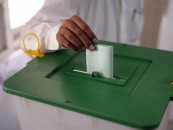Sindh pushes vasectomy to control population growth
Population Welfare Depart to conduct door-to-door surveys in all 1,600 union councils

The Sindh government has launched a renewed drive to slow the province's rapid population growth, which increases annually by about 1.4 million, equivalent to the population of an entire district, by promoting male sterilisation through vasectomy and self-administered contraceptives for women.
Sindh Population Welfare Secretary Hafeezullah Abbasi told The Express Tribune that the department, in collaboration with Johns Hopkins University, will conduct door-to-door surveys in all 1,600 union councils.
The initiative will also target around five million factory workers through awareness sessions, while school and university students will be educated on the impact of unchecked population growth.
"Since men usually make major household decisions, it is important to involve them in these programmes," Abbasi said, adding that 3,000 men in Sindh have already undergone vasectomy, many due to hereditary blood disorders like thalassaemia or because they were living with HIV/AIDS.
Abbasi said contraceptive services, including sterilisation, birth-spacing devices, pills and Sayana Press, a self-injectable contraceptive that provides a three-month gap between pregnancies, are being provided in coastal areas and on islands. The Sayana Press option, he added, has been used about 1.3 million times since 2018.
Director of Administration Faisal Meher said that contraceptive supplies, including sterilisation kits, IUCDs, implants, injections and pills, are regularly provided to major hospitals, the Health Department and NGOs. Family planning centres in 20 gynaecology wards of nine major hospitals provide IUCDs, which prevent pregnancy for up to 10 years, and implants, effective for 3-5 years.
Meher said Sindh's contraceptive prevalence rate was 31% in 2017-18, with targets to raise it to 47% by 2025 and 57% by 2030. He added that male sterilisation cases in Karachi have risen sharply, from just 23 to 2,500 in 2022, as more than 1,000 male mobilisers from HANDS are being trained to promote vasectomy awareness.
Early marriages in rural Sindh mean many women have six to eight children by the age of 30, Meher said, underscoring the urgency of the initiative. The programme, supported by Johns Hopkins University, SZABIST University and the Bill & Melinda Gates Foundation, aims to help the province meet its Family Planning 2030 targets.
Vasectomy is a surgical procedure that cuts or blocks the vas deferens, preventing sperm from being released during ejaculation. However, it doesn't affect erection, libido, orgasm and ejaculation (though semen won't contain sperm).
Vasectomy is a permanent birth control method, but it doesn't impact sexual function or pleasure. Men can resume sexual activity usually 1-2 weeks after the procedure, depending on their doctor's advice.




















COMMENTS
Comments are moderated and generally will be posted if they are on-topic and not abusive.
For more information, please see our Comments FAQ